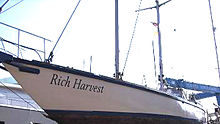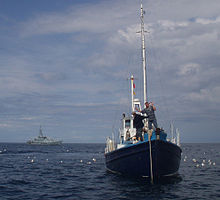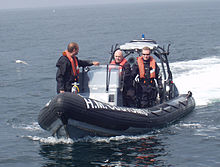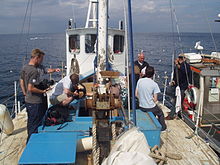- Offshore off-licence
-
The "Offshore Off-Licence" is the name coined by the media to describe a 2004 venture[1] to bring cut-price alcohol and cigarettes to the people of Teesside.[2] Two businessmen, Phil Berriman [3] and Trevor Lyons, used the latter's 72' staysail schooner "Rich Harvest" to transport large quantities of cigarettes and spirits from Heligoland (a tiny island in the German Bight, off Jutland) to Hartlepool. The vessel was anchored just outside the UK's 12-mile limit, and people from Hartlepool came out in private boats to buy cheap "booze & fags".
After a storm, the "Rich Harvest" put into port, flying the yellow "Q" flag[4] to notify HM Customs & Excise (now HM Revenue & Customs) officers that dutiable goods were aboard. Customs were unsure what to do. At first they merely sought to make the vessel secure, to prevent unlawful unloading. The next day, higher authority ordered the vessel to leave port within 36 hours, but just as the vessel was about to leave, Customs changed their mind and refused to allow the vessel and its cargo to depart. The cargo was seized[5] and taken to a bonded Customs warehouse. Some weeks later,[6] Customs decided to return the goods, but demanded that they be exported immediately. The goods were loaded onto a different vessel, a former Trinity House support vessel called the "Cornish Maiden".[7] (The much more valuable "Rich Harvest" was not used this time, in case it became liable to seizure and forfeiture).
The "Cornish Maiden" (which belonged to Berriman [8]) motored to a position 12 miles off Hartlepool, where it anchored and made ready for trade.[9] By this time, a large 140' customs cutter was waiting, and stayed in attendance throughout daylight hours. Hartlepool residents who came out to buy goods were followed back to shore by a customs RIB from the cutter. Potential buyers were scared off when Customs then announced that they would "seize any boat that visited " the Cornish Maiden.[10] From then on, no sales were made, apart from a visit from journalists and cameramen from national newspapers. These media people bought token amounts of goods, but on arrival onshore, these goods were either seized or extra duty demanded. There were no further sales, and after the cutter gave warning that another storm was imminent, the "Cornish Maiden" packed up and headed for port.
The cargo was then seized again [11] by Customs, who had obtained a magistrates court order for the cargo to be impounded. On appeal at Middlesbrough Crown Court, the judge was sympathetic to the venture and held that magistrates were wrong, and ordered the goods to be returned, saying that the "offshore off-licence" was not unlawful but that the seizure of the cargo was wrongheaded and unconscionable. At the 11th hour, Customs appealed to the Divisional Court for a appellate review. On behalf of the venture, barrister Jeremy White [12] relied on the Factortame case, arguing that HMRC's import regulations were arbitrary, restrictive and void for conflicting with the higher authority of EU law; but the Divisional Court, reminiscent of the majority in Liversidge v Anderson, rejected this claim and ordered the case to be reheard in Middlesbrough. At this second Crown Court hearing, a new judge took a rather different view, holding that Customs had been entitled to seize the cargo.[13][14]
Heligoland taxes & duties on the cargo had been paid in full. Lyons, a maritime law expert,[15] and Berriman felt that they would have the support of the European Commission, and they hoped that the case would be referred for a preliminary ruling to the EU's European Court of Justice in Luxembourg. The argument at the ECJ was to have been that the UK action was both disproportionate and in breach of the Treaty of Rome's requirement of "free movement of goods" between Member States. Also, although Customs claimed that a "duty-free allowance" could be claimed only if one had been abroad,[10] there appeared to be no legal requirement for this. First, passengers on English Channel booze cruises were accorded a "duty-free allowance", even though they neither stepped ashore in France, nor necessarily entered French waters; secondly, a person abroad could buy goods for others provided he acted as agent; and thirdly, even HMRC regulations seemed to require only that the importer had left UK jurisdiction to obtain the goods, with no need to land abroad.
Nevertheless, the duo's funds for litigation could not match HMRC's "deep pockets", and the case proceeded no further. The cargo (comprising over a million cigarettes and a thousand bottles of spirits) which was being held partly by HMRC and partly by a private bonded warehouse, "InBond",[16] was "disposed of" without notice, and no details were ever released of the cargo's final destination.
References
- ^ Duo Float Great Idea For Offshore Business - UK420
- ^ Modern-day pirate's offshore off-licence - Local - Hartlepool Mail
- ^ Skipper challenges Customs with his offshore off-licence - Telegraph
- ^ Flags, ensigns and flag etiquette
- ^ Offshore off-licence man has booze seized - Local - Hartlepool Mail
- ^ Relaunch of offshore off-licence delayed (From The Northern Echo)
- ^ BBC NEWS | UK | England | Tees | Offshore off-licence will reopen
- ^ BBC NEWS | UK | England | Tees | Offshore off-licence sold on web
- ^ BBC NEWS | UK | England | Tees | Second offshore off-licence sails
- ^ a b Customs: We'll seize boats visiting offshore off-licence (From The Northern Echo)
- ^ Offshore off-licence stock seized | Metro.co.uk
- ^ The Legal 500 > Pump Court Tax Chambers (Chambers of Andrew Thornhill QC) > London, ENGLAND > Lawyer profiles > Jeremy White
- ^ http://www.mcgrigors.com/pdfdocs/tax_lit_revenue_customs.pdf
- ^ http://www.mcgrigors.com/pdfdocs/duty_calls_07.pdf
- ^ Offshore Off Licence Is Hit By Customs | Home | Sky News
- ^ General and Bonded Storage by InBond Limited / +44 (0) 1642 867000 / www.inbond.com
External links
Her Majesty’s Commissioners for Revenue and Customs v Berriman [2007] EWHC 1183 (Admin); [2007] 4 All ER 925
Categories:- Alcohol law in the United Kingdom
Wikimedia Foundation. 2010.




